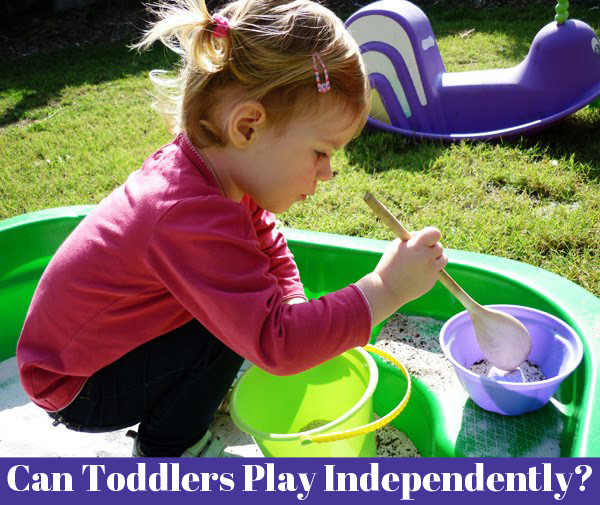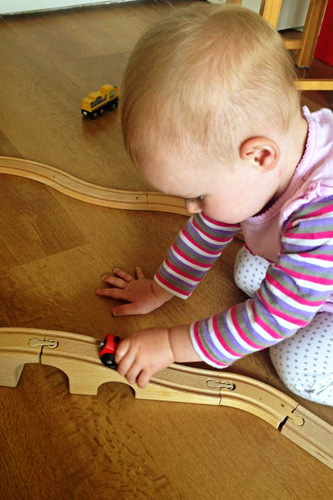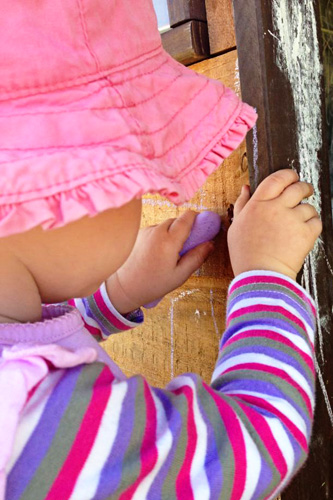Can Toddlers Play Independently?
This post is in response to the two requests for help I have recently received from Childhood 101 readers about toddlers and independent play. This is an extract from one reader’s email…
Now as a SAHM, I make an effort to ensure J has interesting play experiences which sometimes I will be involved with. J is an only child and I find she relies on me a lot to play with her. Sometimes she becomes quite upset if I say no to playing with her if I am doing other things (cooking, cleaning, card making, watching tv, etc). Which in turn makes me feel guilty. I just don’t find ‘playing’ all day long stimulating. In public, Jess is a outgoing, confident child and will happily play with other children.
I would really appreciate some advise/feedback. I understand that you also have a daughter and I just wanted to get an idea of how much are you involved with her daily play and does your daughter happily play solo? After you set up an activity, how do you step away and not be involved? Or are you involved with your daughters play?
Now, I certainly understand the frustration of being at home and the expectation to play with a toddler all day long. I too struggle with finding the balance between how much time I should be actively playing with Immy and how often (and for how long) she should be playing alone. And in all honesty, I hate these ‘shoulds’ that we as parents face nowadays! As I expect that my expectation will differ from each of yours thanks to our own life experiences and circumstances, and that is okay.
I do however personally think it is natural for a toddler at home all day with Mum (or Dad) to want to play with you, after all you are Mum (or Dad), you are there and you are fun, especially when the toddler is an only child or the older sibling to a baby. Two to three year olds are traversing a phase of development where one moment they are all about being independent and the next they are fiercely clinging to you (or throwing themselves on the floor when you say ‘no’). Learning to be independent of Mum and Dad in life, and in play, is a process which takes time.
I also find that circumstances can impact upon this type of behaviour – demanding you play or becoming upset when you cannot play – for example, I often find Immy demands me play even more when we have been stuck home, just the two of us, for days on end because we have been sick and I can understand why that happens.
When it comes to how I get around the situation, these are a few things that work for us;
- We have a dedicated play space for Immy’s toys. We are fortunate in this house to have a playroom but in our last house it was a corner of the lounge room. Both of these areas have been part of our living space, so Immy knows I am nearby when I am working or doing chores. I try and make sure that this area is tidy and attractive and engaging. If you want a child to be switched onto engaging with play, making the space organised and interesting helps. I often also create invitations to play (you can read more about these here and here) which capture Immy’s imagination and lead her into a new play experience which she is usually happy to explore independently because it is both new and of interest to her.
- We are also fortunate that our backyard is quite toddler safe and Immy will happily potter about outdoors while I work nearby.
- Find ways to involve your child in what you are doing. Let them help put away the dishes or clean laundry. If you are crafting, give them some materials to sit beside you and create with too. If you are working, set up a table and chairs beside you with paper and drawing materials, stickers and post it notes, so they can ‘work’ too.
- I am aware of those times of the day when Immy might be particularly clingy – if she is tired or hungry usually (and often when I need to be preparing dinner!) and I try and have something ready to keep her engaged. This might be a small pre-dinner snack or something she can do alongside me at the bench – playdough works well, or a mixing bowl with a whisk, a little water and a squirt of dishwashing liquid, or even some plastic dishes in the sink and a dishcloth! Immy has a step stool that she can stand on and work at bench height which helps her to feel involved. This way we can interact and she is busy whilst I quickly get things done.
- One strategy I use is sitting with Immy and engaging her with a play activity and then excusing myself after about 5 minutes or so to do a chore – for example I might say, “Mummy, just needs to go and xxx. I will be back in a few minutes.” Then I check back in and how I respond when I return depends upon how she is doing – sometimes all I need to do is smile or acknowledge her play with a few words and then continue on with chores, other times I may join the play again for another few minutes and repeat the separation process again if I need to. Sometimes I even set the microwave timer before we start playing and then when it beeps I say, “Oops, that is the reminder that Mummy needs to go and xxx. I’ll be back in a moment.”
- I try and be upfront about the expectations I have too. I might say, “We will read this story together but then Mummy needs to put the washing on and you are going to play. What are we going to do after the story? What will you choose to play with?” This way she has time to process the information whilst we read the story. Doesn’t always work but it is worth a try.
I try to remember that this stage, this period of my child’s life, will be over before I know it, in a twinkling of an eye she will be rolling her eyes at the idea of the two of us spending time together! So I enjoy it whilst I can 🙂
Do you have any tips for encouraging toddlers to play independently?
Related Posts




Great post! I have also found that by helping a 2 or 3 year old embrace and learn imaginary play, reinacting stories from books, or imatation of my cooking, or cleaning builds their self confidence so that they know they can play independently. This reinforcement takes place while I am in the room, somewhat engaged in what she is playing, but letting her take the lead.
these are fabulous tips!
We've used all of these with our kids… For us what especially works is being near by…so having the toys and activities in our living areas, or setting up a little table in the study or the kitchen so I can do what I need/want to do and still be near by to interact and help while our three year old plays…
Great advice Christie. I love the over timer idea, I am going to try that one out. At dinner time I usually put the TV on to distract Will but I think he would much rather "help" me in the kitchen so i am going to try out your ideas, wish me luck!
There are some wonderful ideas there!
We also have a stool in our kitchen, sometimes he uses a bar stool and sometimes a step so he can stand.
I also swap the toys around and swap toys and activites with my sister in law so there's always something to discover.
I love your invitations to play.
This is a very relevant post for me. I’ve been going back to blogs like yours to see where I have gone wrong! I’ve created an interesting situation, I think. I have two children, 5 and 3. They rely heavily on me for their play. I guess I have made things really fun over their short lives. There isn’t a thing we haven’t done! But now, when I wish to have some time to myself, it’s a drama. I end up yelling at them to go and play together without me which ultimately feels as if it’s punishment for them. I don’t want to make it feel like it’s a negative thing to play without me. You have given some food for thought and I hope to find a balance soon…
Good advice but as someone with ADHD, I can see that last one (switching gears between kids and chores) being extremely difficult to do. I’m not saying that it isn’t the best option but is there an alternative idea that would work? I like the idea of including your child in the chores, although in my 2yr old son’s case it ends up backfiring (him throwing clothes on the floor that’s been folded then throwing a tantrum if I don’t leave them on the floor).